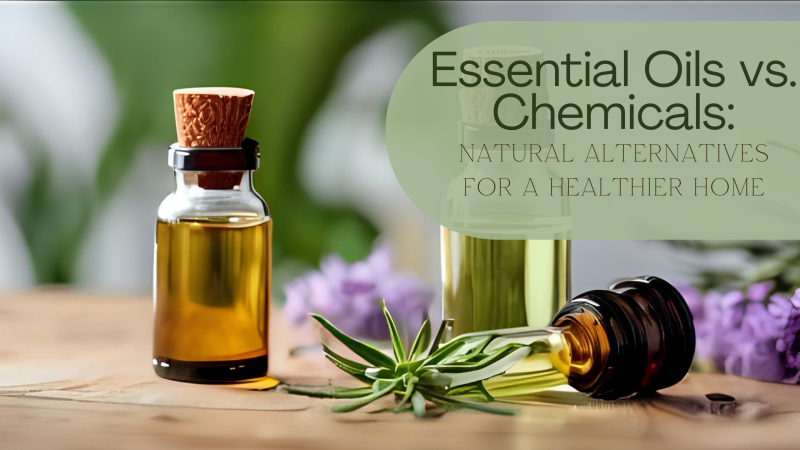
When it comes to creating a fresh, inviting home, many people reach for candles, sprays, or cleaners filled with synthetic fragrances and harsh chemicals. While these products may smell nice or appear effective, they can actually introduce toxins into your living space that affect your health and well-being. The good news?
Essential oils offer a safe, natural alternative that not only makes your home smell amazing but also supports your wellness.
The Problem with Chemical Fragrances
Most commercial air fresheners, candles, and household cleaners rely on synthetic chemicals to create scent or enhance cleaning power. These often contain volatile organic compounds (VOCs), which can irritate the lungs, trigger allergies, or contribute to long-term health issues when used regularly. For sensitive individuals, chemical-based products may cause headaches, dizziness, or skin irritation.
Why Avoid Toxins and Harsh Chemicals?
Many everyday household products—like cleaners, candles, and air fresheners—contain toxins and harsh chemicals that may seem harmless at first but can build up in your environment and affect your health over time. These substances often release volatile organic compounds (VOCs), which can irritate the lungs, trigger allergies, and contribute to headaches, dizziness, or fatigue. Some chemicals have even been linked to long-term health concerns, including hormone disruption and respiratory conditions.
Choosing to avoid these chemicals helps create a safer, healthier home, especially if you have children, pets, or sensitivities. By swapping them out for natural alternatives—like essential oils, vinegar, baking soda, or beeswax candles—you can reduce your exposure to toxins while still keeping your home fresh, clean, and inviting. It’s a small lifestyle shift that supports both your well-being and the environment.
Essential oils are concentrated plant extracts that capture the natural fragrance and therapeutic properties of herbs, fruits, flowers, and spices. Unlike chemical fragrances, they don’t just mask odors—they can actually support physical and emotional wellness. For example:
-
Lavender promotes calm and relaxation.
-
Lemon offers a clean, uplifting scent while supporting focus.
-
Tea tree has natural antibacterial and antifungal properties.
-
Eucalyptus can refresh your space while supporting respiratory health.
Benefits of Essential Oils
1. Natural Aromatherapy Support
-
Scents like lavender, peppermint, and citrus can influence mood, reduce stress, and promote relaxation or focus.
2. Non-Toxic Home Fragrance
-
Essential oils are a clean, chemical-free alternative to synthetic air fresheners, candles, and sprays.
3. Immune System Support
-
Oils like eucalyptus, tea tree, and oregano have natural antibacterial and antiviral properties.
4. Respiratory Relief
-
Peppermint and eucalyptus can help open airways and support easier breathing.
5. Stress & Anxiety Reduction
-
Lavender, bergamot, and frankincense promote calm and help balance emotions.
6. Improved Sleep Quality
-
Diffusing lavender or chamomile before bed encourages relaxation and restful sleep.
7. Natural Cleaning Power
-
Lemon, tea tree, and thyme oils have antimicrobial properties, making them powerful (and safe) cleaners.
8. Energy & Focus Boost
-
Peppermint, rosemary, and citrus oils can increase alertness and concentration.
9. Skin & Hair Care
-
Tea tree can help with blemishes, rosemary supports scalp health, and frankincense promotes youthful-looking skin.
10. Seasonal Mood Support
-
Citrus oils can help combat winter blues, while grounding oils like cedarwood and sandalwood create a sense of calm.
Essential oils are versatile and can be used in diffusers, DIY cleaners, skincare, room sprays, or even bath blends—making them a powerful wellness tool for your home and lifestyle.
Small Swaps for a Chemical-Free Home
1. Air Fresheners → Essential Oil Diffuser
-
Trade synthetic sprays or plug-ins for diffusers with natural oils like lavender, citrus, or cedarwood.
2. Dryer Sheets → Wool Dryer Balls
-
Add a few drops of essential oil to wool dryer balls for fresh, toxin-free laundry.
3. Conventional Cleaners → DIY Natural Cleaners
-
Use vinegar, baking soda, and lemon or tea tree oil for safe, effective cleaning.
4. Scented Candles → Beeswax or Soy Candles
-
Choose candles scented with essential oils instead of paraffin candles with synthetic fragrances.
5. Room Sprays → DIY Herbal Spritz
-
Make your own spray with water, witch hazel, and essential oils (like orange + cinnamon for fall).
6. Synthetic Disinfectant Wipes → Reusable Cloth + Natural Solution
-
Mix water, vinegar, and a few drops of tea tree or eucalyptus oil in a spray bottle.
7. Store-Bought Potpourri → Herbal Simmer Pots
-
Simmer apples, cinnamon, cloves, or citrus peels on the stove for natural fragrance.
8. Synthetic Hand Soap → Castile Soap Blends
-
Mix Castile soap with water and a few drops of lavender or peppermint oil for gentle, natural cleansing.
These swaps are simple, budget-friendly, and can be done gradually—making it easy to move toward a healthier, toxin-free lifestyle.
12 Basic Essential Oil Blends
Uplifting Citrus
-
3 drops sweet orange
-
2 drops grapefruit
-
1 drop lime
Cozy & Grounding
-
3 drops cedarwood
-
2 drops sandalwood
-
1 drop vanilla
Energize & Focus
-
3 drops peppermint
-
2 drops lemon
Immune Support
-
2 drops tea tree
-
2 drops eucalyptus
-
2 drops lemon
Stress Relief
-
3 drops bergamot
-
2 drops frankincense
-
1 drop lavender
Clean & Fresh
-
3 drops lemon
-
2 drops tea tree
-
1 drop lavender
Breathe Easy
-
3 drops eucalyptus
-
2 drops peppermint
-
2 drops rosemary
Relax & Unwind
-
3 drops lavender
-
2 drops chamomile
Sleepy Time
-
3 drops lavender
-
2 drops cedarwood
-
1 drop chamomile
Fresh Linen
-
3 drops lavender
-
2 drops lemon
-
1 drop bergamot
Morning Sunshine
-
3 drops grapefruit
-
2 drops lemon
-
1 drop peppermint
Calm & Centered
-
3 drops frankincense
-
2 drops lavender
-
1 drop bergamot
Tips for Using Essential Oils Safely
While essential oils are natural, they are also highly concentrated. Always dilute them properly before applying to skin or surfaces, and keep them out of reach of children and pets. Quality matters too—choose pure, therapeutic-grade oils free from synthetic additives.




Add comment
Comments